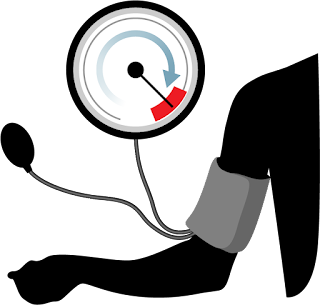High Blood Pressure
Title: Understanding High Blood Pressure: Causes, Effects, and Management
Introduction:
High blood pressure, also known as hypertension, is a common medical condition affecting millions of people worldwide. It occurs when the force of blood against the walls of the arteries is consistently too high. While hypertension may seem harmless initially, it significantly increases the risk of serious health complications, including heart disease, stroke, and kidney problems. In this article, we will explore the causes, effects, and effective management strategies for high blood pressure.
Causes and Risk Factors:
Several factors contribute to the development of high blood pressure:
1. Lifestyle Choices: Unhealthy lifestyle habits such as poor diet, excessive salt intake, lack of physical activity, tobacco use, and excessive alcohol consumption can raise blood pressure levels.
2. Genetics and Family History: Hypertension can run in families, indicating a genetic predisposition. If your parents or close relatives have high blood pressure, you may have an increased risk of developing it as well.
3. Age and Gender: The risk of hypertension increases with age. Men are more prone to developing high blood pressure before the age of 55, while women have an increased risk after menopause.
4. Obesity and Overweight: Excess weight puts additional strain on the heart and blood vessels, leading to higher blood pressure levels.
5. Chronic Conditions: Certain medical conditions like diabetes, kidney disease, and sleep apnea can contribute to the development of hypertension.
Effects and Complications:
High blood pressure is often called the "silent killer" because it usually does not cause noticeable symptoms until it reaches dangerously high levels. If left uncontrolled, hypertension can lead to severe health complications, including:
1. Heart Disease: High blood pressure strains the heart, increasing the risk of coronary artery disease, heart attacks, and heart failure.
2. Stroke: Hypertension damages and weakens blood vessels, increasing the likelihood of a stroke, which occurs when blood flow to the brain is interrupted.
3. Kidney Problems: Persistent high blood pressure can damage the blood vessels in the kidneys, affecting their ability to filter waste and toxins effectively.
4. Vision Loss: Hypertension can cause damage to the blood vessels in the eyes, leading to vision problems and even blindness.
5. Cognitive Impairment: Chronic hypertension has been linked to an increased risk of cognitive decline and dementia later in life.
Management and Treatment:
Although high blood pressure cannot be cured, it can be effectively managed to reduce the risk of complications. Here are some key management strategies:
1. Healthy Lifestyle Habits: Adopting a healthy lifestyle is crucial in managing blood pressure. This includes maintaining a balanced diet rich in fruits, vegetables, whole grains, and lean proteins, reducing sodium intake, engaging in regular physical activity, avoiding tobacco use, and limiting alcohol consumption.
2. Medications: In some cases, lifestyle changes alone may not be sufficient to control blood pressure. Doctors may prescribe medications, such as diuretics, beta-blockers, ACE inhibitors, or calcium channel blockers, to help lower blood pressure and manage hypertension.
3. Regular Monitoring: Regular blood pressure checks are essential to monitor your levels and track any changes. This can be done at home with a blood pressure monitor or during routine medical check-ups.
4. Stress Management: Chronic stress can contribute to high blood pressure. Engaging in relaxation techniques like meditation, deep breathing exercises, and regular physical activity can help manage stress levels.
5. Regular Medical Check-ups: It is important to have regular visits to your healthcare provider to monitor your blood pressure and assess overall health. This allows for early detection of any potential issues and adjustments to treatment plans if necessary.
Conclusion:
High blood pressure is a prevalent health condition that requires attention and effective management. By adopting a healthy lifestyle, adhering to prescribed medications,
and regularly monitoring blood pressure levels, individuals can effectively manage hypertension and reduce the risk of serious complications. Remember, early detection, timely treatment, and consistent self-care are key to maintaining healthy blood pressure levels and overall well-being.


Comments
Post a Comment